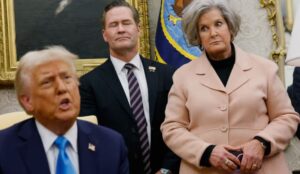Our present experience suggests that the nation’s founders failed to prevent what they feared. Why were they so eager to pretend Britain was a top-down monarchy?
At the Second Continental Congress in Philadelphia the colonists’ representatives reveled in anti-monarchist thought. The founding fathers wanted to create a way to avoid a monarchy, beginning the work of establishing a government to be shared by three co-equal branches. They were certain there would be no equivalent to King George III in what would become the federal district established along the Potomac. John Adams was among the first to propose the three-way power sharing we are supposed to have today. So there is a dark irony in the fact that we now have—more or less–what he and his deliberators in 1776 wanted to avoid. And though it is not fair to simply cast blame for a lack of foresight at this and the later 1787 Constitutional convention, it is clear that the founders’ vision of distributed power failed to adequately account for the possibility of a runaway presidency.
Today evidence of the near-collapse of legislative and judicial functions at the federal level is all around us. One party controls all three branches of government. Indeed, we have a single-party controlling majorities in both houses of Congress who functions more like spectators than participants in the Trump circus. One can wonder if those folks in the majority should be paying Broadway theater prices for the seats they occupy as passive observers to the dismemberment of the federal government. The courts are more active, but mostly delay but not change the Trump agenda. And both lack any constitutional teeth to punish the executive bureaucracy for overreach, leaving the Presidency with increasingly unchecked power. The rarely used “guard rooms” in the basement of the Capitol are a reminder of the limited power of Congress to enforce anything it does. As to the judiciary, “court shopping” and long appeals processes today endlessly postpone reckonings for most of the wealthy who are facing civil or criminal actions.
![]()
In hindsight, there should be more direct constitutional checks on the abuse and compliance enforcement acts undertaken by the misnamed ‘administrative’ branch of government.
Only the Commander-in-Chief has broad authority to oversee what has evolved from administrative to policing agencies. They range from the military services to the F.B.I., to HHS. For example, in a break with precedent Donald Trump is using the Department of Justice to pursue his own urges for punishment and retribution. Ditto for federally supported arts, education, and research units in every corner of the nation. Article II of the constitution is mostly silent on limiting these magnifications of power.
 In short, the nation’s founders failed to prevent what they feared. We have a President who behaves like a king. Moreover, in hindsight it is obvious that founders like James Madison knew that Britain’s civil life even in the mid-1700s did not amount to a simple monarchy. The House of Commons evolved much earlier, in the 13th and 14th centuries. Even a cursory reading of British history yields the conclusion that an active parliamentary system in Britain was established well before America declared her independence. The founders would have known about the power of Sir Robert Walpole, who dominated the political scene in London and became the first British Prime Minister. They had the example of an emerging parliamentary system of government if they wanted to consider it.
In short, the nation’s founders failed to prevent what they feared. We have a President who behaves like a king. Moreover, in hindsight it is obvious that founders like James Madison knew that Britain’s civil life even in the mid-1700s did not amount to a simple monarchy. The House of Commons evolved much earlier, in the 13th and 14th centuries. Even a cursory reading of British history yields the conclusion that an active parliamentary system in Britain was established well before America declared her independence. The founders would have known about the power of Sir Robert Walpole, who dominated the political scene in London and became the first British Prime Minister. They had the example of an emerging parliamentary system of government if they wanted to consider it.
Why were the founders so eager to pretend Britain was a top-down monarchy? It turns out that scapegoating to the mentally challenged king was perhaps a bit too easy. I have new sympathies for the loyalists within the colonies who were willing to stake their futures on British rule and the advantages of a parliamentary system over a republic. Even within a titular monarchy, parliamentary governments have advantages and flexibilities that are lost in republics like ours which thwart direct elections and are slow to adapt to changing political circumstances. Our system leaves disastrous parties and our own mentally challenged Presidents in control for far too long. And so we stagnate. Constitutionally, and when a political party is complicit, we have no viable pathways to “no confidence” votes against a leader that could pull us out of our civil miseries.



